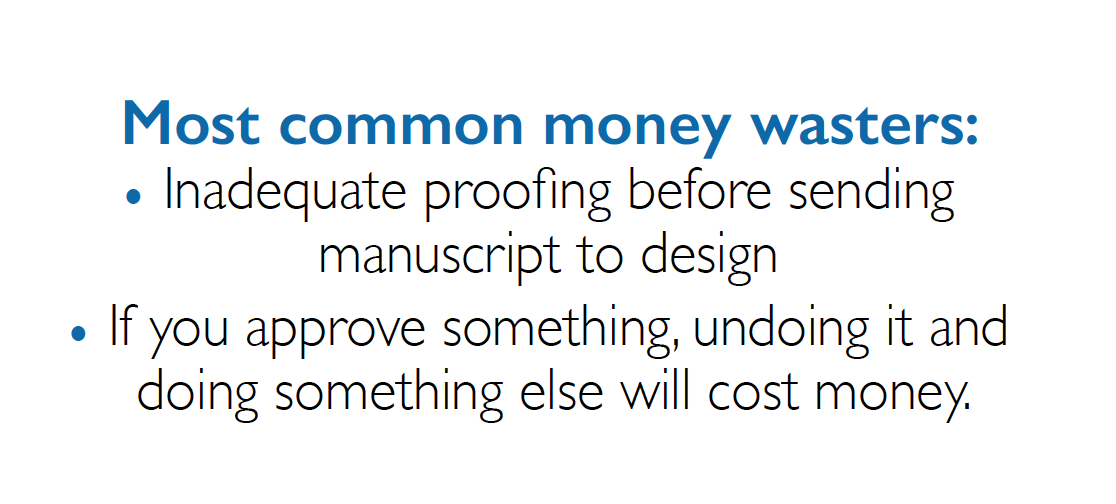This notice appears at the top of Typeflow's rate sheet:
This could be seen as working against myself, since when money's wasted on a book, I'm often the one who gets richer—but I hate seeing my clients spend more than they need to. I was a writer before I was a book designer (it's why I'm a book designer), and that's where my sympathies lie.
But I'll still charge for these things if they happen on your book, so listen up. Today we're talking about…
Inadequate proofing
"Yes, it's being proofed now. My friend was an English major. She catches everything."
This red flag is so big, it can be seen from space:
Your cousin who knows everything about grammar and your fellow writing group member who's really picky are first readers, or beta readers, or—to put it more simply—friends. They're not proofers, and they don't do what a proofer does. They're going to read the book and mark up anything they notice, but they're not trained to notice the things that are going to cost you money later—and, for the most part, they're not as right as they think they are about grammar and punctuation. (No, not even the English lit professor.) They probably also aren't solid on when to use small caps instead of italics or rigorous about en dashes, em dashes, 2-em dashes, 3-em dashes, and hyphens. And then there are all the differences between narrative and dialogue, fiction and collateral, essays and poetry.
People who don't proof for a living are as good at proofing as people who don't rebuild transmissions all the time are good at rebuilding a transmission.
I asked my favorite proofer, Chesley Hicks, for some examples for this blog entry. She said:
Do they know the difference between open, closed, and hyphenated compounds or how those change as modifiers and nouns? Can they spot a stack or a river? Do they have the whom/who thing down pat? Do they know how to style a program vs a series vs an episode title? According to AP? According to CMoS? Can they really tell when to not follow grammar and style rules? You gotta know the rules before you can break them.
To which I'll add: Are they going to go over every proof your designer sends, make sure every change was made correctly, catch where the changes introduced new stacks, rivers, or short chapter ends, and mark it up for the next round? Will they catch where prime marks were used instead of quotation marks—or vice versa? Do they have the habits of an experienced proofer, like making sure when you catch an error in one word, you don't immediately miss the error in the word next to it? (That's really common among non-pros.)
There's only one really excellent reason to use your friends: They're free.
Keep that really excellent reason in mind as you read this:
I charge $1.50 per correction. That's if we're still working on the print book, which comes before the ebook. If a correction isn't made until I'm working on the ebook, it's $3, because now I'm making it twice: once in the print book, once in the ebook.
350 correx at the ebook stage = $1,050.
But 350 corrections is way more than you could possibly be looking at, right?
Maybe, maybe not. In a 350-page book, if each page has just one little misplaced comma, or mistyped space after a hyphen, or misspelled name, or misused word, and now that it looks like a book instead of a Word file, these things are really popping out at you, the result is that you just added a thousand dollars to your design invoice—which may only have been a thousand dollars to start with. Your free proofer wasn't free.
And that's assuming all the changes are little ones. If you decide to rewrite a chapter, or there are so many little changes that the text reflows and messes up the pagination, now we're into hourly rates.
Does this mean you must have your manuscript proofed by a professional proofer?
The answer is yes if you want a professional product. That's why publishers do it. It's not because they have some abstract love of perfection and higher callings; it's that everything in a book's production budget is pure, pragmatic business. If they didn't have to do it, they wouldn't.
The answer may be no if:
you're sure your friend will do a truly professional proofing job or
you're fine with a not entirely professional book—for example, because you know how many units you're going to move from tables at the backs of seminars, regardless of errors, and you don't want to eat into your profit by spending money that won't have any effect on the bottom line.
If you're thinking like a publisher (see "pure, pragmatic business" above), return on investment is your main priority, so (2) might be the right choice for you. However, if you're thinking like an author, every single tiny error will drive you nuts until you fix it. Plus, if there's more than just a couple of typos, that fact will start showing up in your Amazon reviews, which will probably affect your bottom line—and possibly the reputation of your brand and product line. (Whether that effect will be large enough to justify the expense of proofing, only you can decide.)
Depending on your goals, either approach can be the smart one.
Whatever you decide, go into it with your eyes open. If your friend isn't a professional proofreader, the results will not be as professional. Period. They just won't.
I say this as a guy who's spent years watching his invoices go up because of that very fact.


